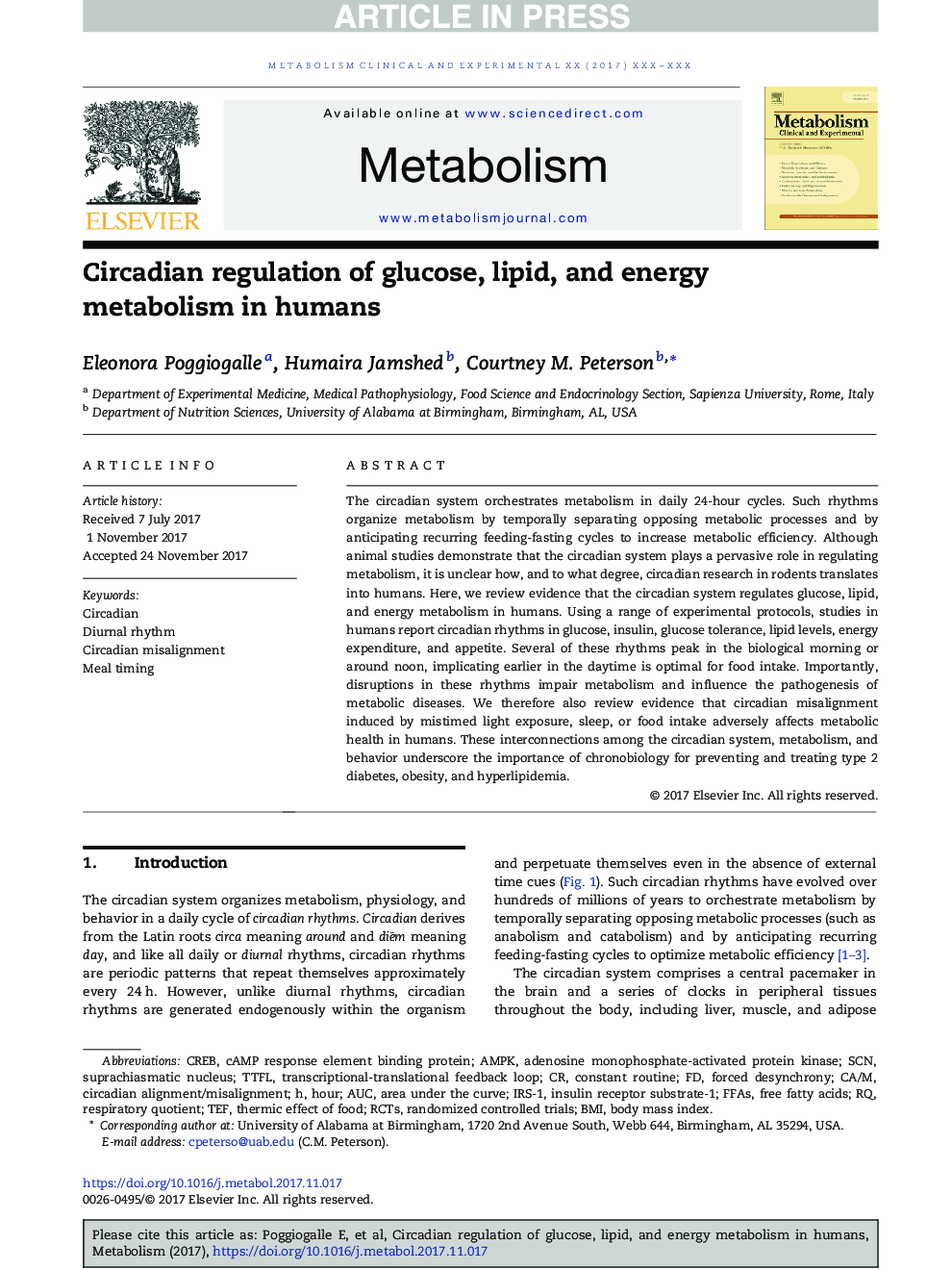| کد مقاله | کد نشریه | سال انتشار | مقاله انگلیسی | نسخه تمام متن |
|---|---|---|---|---|
| 8632933 | 1569025 | 2018 | 17 صفحه PDF | دانلود رایگان |
عنوان انگلیسی مقاله ISI
Circadian regulation of glucose, lipid, and energy metabolism in humans
ترجمه فارسی عنوان
تنظیم چرخه ای از گلوکز، چربی و متابولیسم انرژی در انسان
دانلود مقاله + سفارش ترجمه
دانلود مقاله ISI انگلیسی
رایگان برای ایرانیان
کلمات کلیدی
CREBTTFLRCTsTEFFFAsIRS-1SCNAMPKAUC - AUCRandomized controlled trials - آزمایشهای تصادفی کنترل شدهthermic effect of food - اثر حرارتی مواد غذاییforced desynchrony - اجباری اجباریFree fatty acids - اسیدهای چرب آِزادinsulin receptor substrate-1 - انسولین گیرنده زیربخش 1circadian - دیروزConstant routine - روال ثابتDiurnal rhythm - ریتم روزانهMeal timing - زمان بندی غذاHour - ساعتRespiratory quotient - سهم تنفسیbody mass index - شاخص توده بدنBMI - شاخص توده بدنیarea under the curve - منطقه تحت منحنیCircadian misalignment - ناهماهنگی دورانیSuprachiasmatic nucleus - هستههای سوپراکیاسماتیکcAMP response element binding protein - پروتئین اتصال دهنده عنصر پاسخ cAMPadenosine monophosphate-activated protein kinase - پروتئین کیناز فعال شده با آدنوزین مونوفسفات
ترجمه چکیده
سیستم دایکندی متشکل از متابولیسم در چرخه 24 ساعته روزانه است. چنین ریتم هایی متابولیسم را سازماندهی می کنند و به طور موقت جداسازی متضاد فرایندهای متابولیک و پیش بینی دوره های تغذیه ناگهانی را برای افزایش کارآیی متابولیسم انجام می دهند. اگر چه مطالعات حیوانی نشان می دهد که سیستم دایکندیان نقش مهمی در تنظیم متابولیسم را ایفا می کند، مشخص نیست که چگونه و به چه میزان، تحقیقات روزانه در جوندگان به انسان تبدیل می شود. در اینجا شواهدی را شاهد هستیم که سیستم دایکندی تنظیم کننده متابولیسم گلوکز، چربی و انرژی در انسان است. با استفاده از طیف وسیعی از پروتکل های تجربی، مطالعات در انسان، ریتم های روزانه را در گلوکز، انسولین، تحمل گلوکز، سطح چربی، هزینه انرژی و اشتها گزارش می کنند. تعدادی از این ریتم ها در صبح زود یا در محدوده ظهر به حداکثر می رسند، که پیش از آن در روز در معرض آن قرار می گیرد، برای مصرف غذا مطلوب است. مهمتر از همه، اختلال در این ریتم ها باعث سوخت و ساز بدن می شود و بر پاتوژنز بیماری های متابولیک تأثیر می گذارد. بنابراین ما همچنین شواهدی را مرور میکنیم که ناسازگاری شبانه روزی ناشی از نوردهی نادرست نور، خواب یا مصرف غذا بر سلامت متابولیک انسان تاثیر میگذارد. این ارتباطات بین سیستم دایره ای، متابولیسم و رفتار، اهمیت کرونبیولوژی را برای جلوگیری و درمان دیابت نوع 2، چاقی و هیپرلیپیدمی نشان می دهد.
موضوعات مرتبط
علوم زیستی و بیوفناوری
بیوشیمی، ژنتیک و زیست شناسی مولکولی
علوم غدد
چکیده انگلیسی
The circadian system orchestrates metabolism in daily 24-hour cycles. Such rhythms organize metabolism by temporally separating opposing metabolic processes and by anticipating recurring feeding-fasting cycles to increase metabolic efficiency. Although animal studies demonstrate that the circadian system plays a pervasive role in regulating metabolism, it is unclear how, and to what degree, circadian research in rodents translates into humans. Here, we review evidence that the circadian system regulates glucose, lipid, and energy metabolism in humans. Using a range of experimental protocols, studies in humans report circadian rhythms in glucose, insulin, glucose tolerance, lipid levels, energy expenditure, and appetite. Several of these rhythms peak in the biological morning or around noon, implicating earlier in the daytime is optimal for food intake. Importantly, disruptions in these rhythms impair metabolism and influence the pathogenesis of metabolic diseases. We therefore also review evidence that circadian misalignment induced by mistimed light exposure, sleep, or food intake adversely affects metabolic health in humans. These interconnections among the circadian system, metabolism, and behavior underscore the importance of chronobiology for preventing and treating type 2 diabetes, obesity, and hyperlipidemia.
ناشر
Database: Elsevier - ScienceDirect (ساینس دایرکت)
Journal: Metabolism - Volume 84, July 2018, Pages 11-27
Journal: Metabolism - Volume 84, July 2018, Pages 11-27
نویسندگان
Eleonora Poggiogalle, Humaira Jamshed, Courtney M. Peterson,
